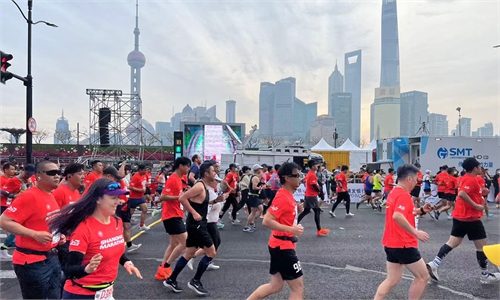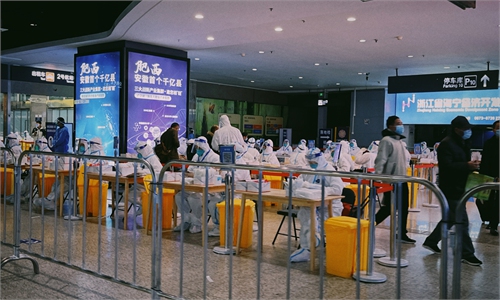
Residents enjoy outdoor activities at the Bund in Shanghai in November. Photo: Xinhua
Shanghai on Thursday released more detailed measures as a part of implementation of China's newly released 10 new measures for optimizing COVID-19 response, including removing nucleic acid testing requirements for indoor entertainment venues and restaurants starting from Friday.No COVID-19 negative nucleic acid test certificates are required for indoor entertainment venues and restaurants in Shanghai starting from Friday, according to local authorities. But for the sake of vulnerable groups, special requirements are still needed in places such as the elderly care, children's welfare institutions, medical institutions, schools.
Shanghai has made it clear that no mass nucleic acid testing will be carried out at the administrative region level; except employees in high-risk positions and high-risk areas, other personnel can take the tests voluntarily, and residents without testing records within seven days will no longer be subject to a yellow health code, Wu Jinglei, deputy director of the office of municipal epidemic prevention and control leading group, said at Thursday's press briefing.
But Shanghai will continue to maintain regular nucleic acid testing sites and provide free testing services, said Wu.
A scientific classified treatment for COVID-19 positive cases will be conducted. Based on the new measures issued by Shanghai on Thursday, symptomatic carriers, mild COVID-19 cases meeting certain requirements will be allowed to quarantine at home starting from Friday, as part of the national adjustment in epidemic prevention policies.
Health monitoring of those positive cases will be strengthened during home quarantine, and they will be free from quarantine if their CT value equals or is above 35 for two consecutive times on the sixth and seventh day of quarantine. Patients with worsening conditions should be transferred to designated hospital for treatment in time, said the authorities.
The city has released optimized COVID rules for travelers and close contacts. Testing requirements have been scrapped for arrivals in the city, including requiring three daily tests. Close contacts who meet quarantine requirements can undergo a five-day home quarantine rather than a five-day centralized quarantine plus three-day home quarantine, according to the authorities.
The city authorities said that they have deployed related epidemic prevention measures to ensure normal teaching and class attendance.
People can buy medicines such as antipyretic, cough relief, antiviral and cold over-the-counter medicines online and offline, and residents no longer need to register information before purchasing these medicines.
Shanghai officials suggest elderly residents over 60 years old, especially those over 80 years old, to get vaccinated as soon as possible.
A total of 1,446 local positive cases were reported in Shanghai in November alone, which is relatively high, almost the sum of the four months from July to October, as the impact brought by the growing cases in other regions is significant, said Wu.
About 80 percent of the 1,446 infected people in November were related to the cases from other places, which means that the risk of infection is always there, Wu noted.
From the domestic or international research and monitoring data, the pathogenicity rate and virulence of the Omicron variant strain is decreasing compared with the original strain and Delta strain, said Wu.


